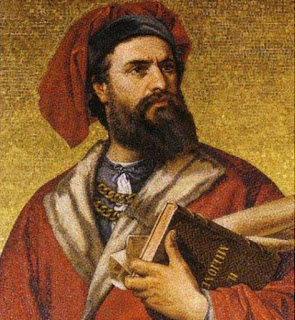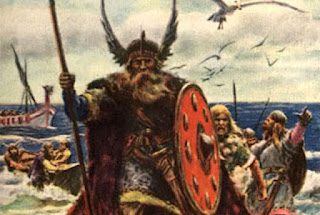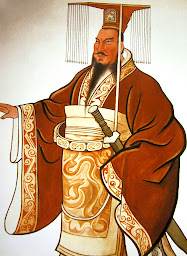 IBN BATTUTA
IBN BATTUTAAbu Abdullah Muhammad Ibn Abdullah Al Lawati Al Tanji Ibn Battuta was born in 1304 in Morocco's northern port of Tangier. Wise beyond his years, at an early age he shortened his name to Ibn Battuta, thereby ensuring that he would not have to go down in history as Abu What's-His-Name, the Greatest Traveler Who Ever Lived.Quoted from Ibnibnbattuta

ADOLF HITLER
Adolf Hitler was born on April 20th 1889 in Braunau-am-Inn, Austria a small town across the Inn River from Germany. World War II began in 1939 when Hitler invaded Poland to begin his unification of all German-speaking peoples. By this time extermination camps were being established throughout Germany, Poland, and Russia. Before Hitler was stopped in 1945 by the Allied countries, he had caused the extermination over 12 million people. Hitler committed suicide in his bunker on April 30,1945 and seven days later, Germany surrendered.Quoted from summaiyah.tripod
IBN KHALDUN

Ibn Khaldun is the most important figure in the field of History and Sociology in Muslim History. He is one of those shining stars that contributed so richly to the understanding of Civilization. In order for one to understand and appreciate his work, one must understand his life. He lived a life in search of stability and influence. He came from a family of scholars and politicians and he intended to live up to both expectations. He would succeed in the field of Scholarship much more so than in any other field.Quoted from muslimphilosophy
CHE GUEVARA

Guevara was born on June 14, 1928 in Argentina. He was a Marxist revolutionary, physician, author, guerrilla leader, and military theorist. He was a major figure of the Cuban Revolution, as well as a prolific writer. He composed a seminal manual on guerrilla warfare, along with a memoir about his motorcycle journey across South America. Images of him have become a symbol of counterculture.Quoted from Biography.com
SULEIMAN THE MAGNIFICENT
Was the tenth and longest-reigning Emperor, Sultan of the Ottoman Empire, from 1520 to his death in 1566. He is known in the West as Suleiman the Magnificent and in the East, as "The Lawgiver" for his complete reconstruction of the Ottoman legal system. Suleiman became a prominent monarch of 16th century Europe, presiding over the apex of the Ottoman Empire's military, political and economic power. Under his rule, the Ottoman fleet dominated the seas from the Mediterranean to the Red Sea and the Persian Gulf.Quoted from Wiki
NAPOLEON BONAPARTE
One of the greatest military leaders in history and first emperor of France, he conquered much of Europe. Napoleon Bonaparte was born on 15 August 1769 in Corsica he was rapidly promoted and in 1796, was made commander of the French army in Italy, where he forced Austria and its allies to make peace. In 1798, Napoleon conquered Ottoman-ruled Egypt in an attempt to strike at British trade routes with India. He was stranded when his fleet was destroyed by the British at the Battle of the Nile.Quoted from BBC
ABRAHAM LINCOLN
Abraham Lincoln, the 16th president of the United States, a self-taught Illinois lawyer and legislator with a reputation as an eloquent opponent of slavery, won the Republican Party's nomination for president in 1860. Civil War began in april 1861. Contrary to expectations, Lincoln proved to be a shrewd military strategist and a savvy leader during what became the costliest conflict ever fought on American soil. His Emancipation Proclamation, issued in 1863, freed all slaves in the rebellious states and paved the way for slavery's eventual abolition. In April 1865, with the Union on the brink of victory, Abraham Lincoln was shot and killed by the Confederate sympathizer John Wilkes Booth; his untimely death made him a martyr to the cause of liberty and Union. He is widely regarded as one of the greatest presidents in the nation's history.Quoted from History
Christopher Columbus
Christopher Columbus (1451-1506) was an Italian explorer who made a total of four trips to the Caribbean and South America during the years 1492-1504.Columbus was the first European since the Viking Leif Ericsson to set foot on the mainland of America.Quoted From EnchantedLearning

Ferdinand Magellan
A Portuguese was most famous for having the 1st voyage around the world. his 5 ships were the Trinidad, the San Antonio, the Conception, the Victoria and the Santiago. Magellan was killed by poison arrow through the foot and a spear through the heart. he died in the island of Cebu in the city of mactan and in the country of Philippines.Quoted From Elizabethan-era
Alexander the Great
Alexander III of Macedon commonly known as Alexander the Great , was born in Pella in 356 BC. Alexander was tutored by Aristotle until the age of 16. Ruled a dominion that stretched from the Balkans to the Himalayas and from Egypt to the Caspian Sea. Possibly the most brilliant soldier in history, he had led a small and poorly equipped European army on a campaign of over 20,000 miles to conquer the mighty Persian Empire. Originally from Iran, the Persians held sway over a domain which also included all of what are now Turkey, Iraq, Afghanistan, Syria, Jordan, Israel and Egypt. It had taken him twelve years and he was still only thirty-two. By the age of thirty, he had created one of the largest empires of the ancient world, stretching from the Ionian Sea to the Himalayas. He was undefeated in battle and is considered one of history's most successful commanders. Alexander died in Babylon in 323 BC. Source Wiki & GrahamPhilips
MARIE ANTOINETTE

Marie Antoinette, the last queen of France was born on November 2, 1755, in Vienna, Austria. Marie Antoinette helped provoke the popular unrest that led to the French Revolution and to the overthrow of the monarchy in August 1792. She became a symbol of the excesses of the monarchy and is often credited with the famous quote "Let them eat cake," although there is no evidence she actually said it. As a 20-year consort to Louis XVI, she was beheaded nine months after he was, on October 16, 1793, by order of the Revolutionary tribunal. Quoted from Biography.com
BEETHOVEN
German composer Ludwig van Beethoven is considered one of the most important figures in the history of music. He continued to compose even while losing his hearing and created some of his greatest works after becoming totally deaf. He was born in Bonn, Germany, on December 16, 1770. Beethoven is best known for his nine symphonies, which have been called the cornerstones of Western civilization. The most famous two are the Fifth Symphony and the Ninth Symphony because of their grandeur. The death of Ludwig van Beethoven on 26 March 1827 in Vienna followed a prolonged illness. Quoted from
Notablebiographies
LEONARDO DA VINCI
Leonardo da Vinci was a leading artist and intellectual of the Italian Renaissance who's known for his enduring works "The Last Supper" and "Mona Lisa." Born on April 15, 1452, in Vinci, Italy, Leonardo da Vinci was concerned with the laws of science and nature, which greatly informed his work as a painter, sculptor, inventor and draftsmen. The famous artist died in Amboise, France, on May 2, 1519.
Quoted from Biography
Vladimir Lenin
Widely considered one of the most influential and controversial political figures of the 20th century, Vladimir Lenin engineered the Bolshevik revolution in Russia in 1917 and later took over as the first leader of the newly formed Union of Soviet Socialist Republics (USSR). He was born Vladimir Ilich Ulyanov on April 22, 1870, in Simbirsk, Russia, which was later renamed Ulyanovsk in his honor. On January 21, 1924 he passed away in the village now known as Gorki Leninskiye. Quoted from Biography.com
Alexandre Dumas

He is one of the most widely read French authors, with perhaps his two most famous novels being "The Count of Monte Cristo" and "The Three Musketeers".Quoted from Historyorb
William Shakespeare
William Shakespeare, often called the English national poet, is widely considered the greatest dramatist of all time.Though little is known about William Shakespeare's personal life, his works such as "Hamlet," "Romeo and Juliet," and "King Lear," have influenced literature and theater for over 400 years.Quoted from Biography
Marco Polo
Vivaldi
Antonio Lucio Vivaldi, known by the nick name, ‘Il Prete Rosso’ (The Red Priest), was a renowned priest, Baroque composer and a talented violinist. Recognized as one among the greatest composers, his influence was prevalent around Europe. He was born on March 4, 1678 and raised in the Republic of Venice. One of his best concertos, the ‘Four Seasons’ was regarded to be his most influential works. He died on 28 July, 1741in Vienna Austria. Quoted From Famouspeople
Charles Dickens
British novelist Charles Dickens was born on February 7, 1812, in Portsmouth, England. Over the course of his writing career, he wrote the beloved classic novels Oliver Twist, A Christmas Carol, Nicholas Nickleby,David Copperfield, A Tale of Two Cities and Great Expectations. On June 9, 1870, Dickens died of a stroke in Kent, England, leaving his final novel, The Mystery of Edwin Drood, unfinished.Charles Dickens was the well-loved and prolific British author of numerous works that are now considered classics.Quoted From Biography
Alessandro Volta
Alessandro Volta was an italian physicist, chemist and a pioneer of electrical science. He is most famous for his invention of the electric battery. He invented the first electric battery – which people then called the “voltaic pile” – in 1800. Using his invention, scientists were able to produce steady flows of electric current for the first time.He also was the first person to isolate methane,and discovered methane mixed with air could be exploded using an electric spark: this is the basis of the internal combustion engine.In recognition of Alessandro Volta’s contributions to science, the unit of electric potential is called the volt.Quoted from Famousscientists
The Vikings
From around A.D. 800 to the 11th century, a vast number of Scandinavians left their homelands to seek their fortunes elsewhere. These seafaring warriors–known collectively as Vikings or Norsemen (“Northmen”)–began by raiding coastal sites, especially undefended monasteries, in the British Isles. Over the next three centuries, they would leave their mark as pirates, raiders, traders and settlers on much of Britain and the European continent, as well as parts of modern-day Russia, Iceland, Greenland and Newfoundland.Most of the Vikings whose activities are best known come from the areas now know as Denmark, Norway and Sweden, though there are mentions in historical records of Finnish, Estonian and Saami Vikings as well. Their common ground–and what made them different from the European peoples they confronted–was that they came from a foreign land, they were not “civilized” in the local understanding of the word.Quoted From History.com
Helen Keller

Helen Adams Keller was born on June 27, 1880 in Tuscumbia, Alabama. In 1882, she was stricken by an illness that left her blind and deaf. Beginning in 1887, Keller's teacher, Anne Sullivan, helped her make tremendous progress with her ability to communicate, and Keller went on to college, graduating in 1904. In 1920, Keller helped found the ACLU. During her lifetime, she received many honors in recognition of her accomplishments.Quoted from Biography.com

Vasco da Gama
Vasco da Gama was the first person to sail directly from Europe to India. Explorer Vasco da Gama was born in Sines, Portugal, around 1460. In 1497, he was commissioned by the Portuguese king to find a maritime route to the East. His success in doing so proved to be one of the more instrumental moments in the history of navigation. He subsequently made two other voyages to India, and was appointed as Portuguese viceroy in India in 1524.Quoted from Biography.com
Tutankhamun
Tutankhamun is ancient Egypt’s most famous pharaoh. Tutankhamun’s mummy shows that he died when he was approximately 18 years old, but it is not known exactly how he died. Tutankhamun ruled Egypt for approximately 10 years from around 1336-1327 BCE. In November 1922, Howard Carter and Lord Carnarvon discovered Tutankhamun's near-intact tomb in the Valley of the Kings. The king's mummified body was found surrounded by precious grave goods, in his golden coffin.quoted from historyextra
Albert Einstein
Albert Einstein, (born March 14, 1879, Ulm, Württemberg, Germany—died April 18, 1955, Princeton, New Jersey, U.S.), German-born physicist who developed the special and general theories of relativity and won the Nobel Prize for Physics in 1921 for his explanation of the photoelectric effect. Einstein is generally considered the most influential physicist of the 20th century.quoted from Britannica.com
Thomas Edison
Thomas Alva Edison is an unparalleled figure in the history of the United States. His next inventive turn after the introduction of the phonograph took an entirely different direction: an electric lighting system. In 1878, after conceiving of a system that could support electrical lighting, Edison began his research in earnest, seeking to develop a method of lighting that could replace candles, kerosene, and gas flames in homes, businesses, and public spaces.quoted from Acs.org

Vasco da Gama
Vasco da Gama was the first person to sail directly from Europe to India. Explorer Vasco da Gama was born in Sines, Portugal, around 1460. In 1497, he was commissioned by the Portuguese king to find a maritime route to the East. His success in doing so proved to be one of the more instrumental moments in the history of navigation. He subsequently made two other voyages to India, and was appointed as Portuguese viceroy in India in 1524.Quoted from Biography.com
Tutankhamun
Tutankhamun is ancient Egypt’s most famous pharaoh. Tutankhamun’s mummy shows that he died when he was approximately 18 years old, but it is not known exactly how he died. Tutankhamun ruled Egypt for approximately 10 years from around 1336-1327 BCE. In November 1922, Howard Carter and Lord Carnarvon discovered Tutankhamun's near-intact tomb in the Valley of the Kings. The king's mummified body was found surrounded by precious grave goods, in his golden coffin.quoted from historyextra
Albert Einstein
Albert Einstein, (born March 14, 1879, Ulm, Württemberg, Germany—died April 18, 1955, Princeton, New Jersey, U.S.), German-born physicist who developed the special and general theories of relativity and won the Nobel Prize for Physics in 1921 for his explanation of the photoelectric effect. Einstein is generally considered the most influential physicist of the 20th century.quoted from Britannica.com
Thomas Edison
Thomas Alva Edison is an unparalleled figure in the history of the United States. His next inventive turn after the introduction of the phonograph took an entirely different direction: an electric lighting system. In 1878, after conceiving of a system that could support electrical lighting, Edison began his research in earnest, seeking to develop a method of lighting that could replace candles, kerosene, and gas flames in homes, businesses, and public spaces.quoted from Acs.org
Qin Shi Huang
Quoted from History.com
Rimsky Korsakov
Abu ‘Ali al-Husayn ibn Sina is better known in Europe by the Latinized name “Avicenna.” He is probably the most significant philosopher in the Islamic tradition and arguably the most influential philosopher of the pre-modern era. Born in Afshana near Bukhara in Central Asia in about 980, he is best known as a polymath, as a physician whose major work the Canon (al-Qanun fi’l-Tibb) continued to be taught as a medical textbook in Europe and in the Islamic world until the early modern period, and as a philosopher whose major summa the Cure (al-Shifa’) had a decisive impact upon European scholasticism.He died of colic in 1037.Quoted from iep
Leo Tolstoy























No comments:
Post a Comment